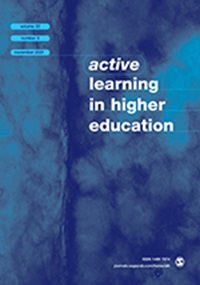绩效评估是一种积极的改进反馈和绩效的方法
IF 3.8
1区 教育学
Q1 EDUCATION & EDUCATIONAL RESEARCH
引用次数: 0
摘要
本文回应了师生反馈研究的呼吁,寻求如何提高学生表现的选择。在研究1中,我们首先观察了学生责任心、期中成绩、反馈寻求行为与期末成绩之间的关系。其次,在研究2中,我们测试了在不考虑个体差异的情况下,使用主动学习方法是否有助于学生提高成绩。具体来说,我们测试了如何在期中实施面对面的师生绩效评估,让那些本来不会寻求额外反馈或清晰表述的学生完全讨论绩效,从而有利于绩效的提高。结构方程模型和平均差异检验用于检验人格、行为和绩效之间的经验关系。在有期中考核和没有期中考核的小组之间进行比较,支持互动式期中考核提高班级成绩的假设。回归分析表明,即使在控制了个体差异之后,绩效评估也能提高成绩。这种积极的学习方法有即时和长期的好处。除了提高成绩之外,期中考核还可以让学生体验如何进行专业的绩效考核,以及如何更有效地接收和使用反馈。讨论提供了一些简单的建议,说明即使在远程课堂上也可以进行期中复习。本文章由计算机程序翻译,如有差异,请以英文原文为准。
Performance reviews as an active method to improve feedback and performance
This paper responds to calls from teacher-student feedback research looking for options on how to improve student performance. In Study 1, we first observe the relationship between student conscientiousness, midterm-performance, feedback-seeking behaviors, and final semester grades. Second, in Study 2, we test whether using an active learning method helps students improve grades regardless of their individual differences. Specifically, we test how the implementation of a face-to-face instructor-student performance review at midterm can be beneficial for performance improvement by allowing students who would otherwise not seek additional feedback or clarity to discuss performance completely. Structural equation modeling and mean difference tests are used to test empirical relationships between personality, behavior, and performance. Comparisons between groups that did and did not include a midterm review supports the hypothesis that interactive mid-term performance reviews improve class grades. Regression analysis supports that performance reviews improve grades even after controlling for individual differences. This active learning technique has both immediate and long-term benefits. In addition to grade improvement, mid-term reviews allow students to experience how to conduct professional performance reviews and receive and use feedback more effectively. The discussion offers simple advice on how midterm reviews can occur even within remote classes.
求助全文
通过发布文献求助,成功后即可免费获取论文全文。
去求助
来源期刊

Active Learning in Higher Education
EDUCATION & EDUCATIONAL RESEARCH-
CiteScore
13.20
自引率
12.00%
发文量
31
期刊介绍:
Active Learning in Higher Education is an international, refereed publication for all those who teach and support learning in higher education (HE) and those who undertake or use research into effective learning, teaching and assessment in universities and colleges. The journal is devoted to publishing accounts of research covering all aspects of learning and teaching concerning adults in higher education. Non-discipline specific and non-context/country specific in nature, it comprises accounts of research across all areas of the curriculum; accounts which are relevant to faculty and others involved in learning and teaching in all disciplines, in all countries.
 求助内容:
求助内容: 应助结果提醒方式:
应助结果提醒方式:


